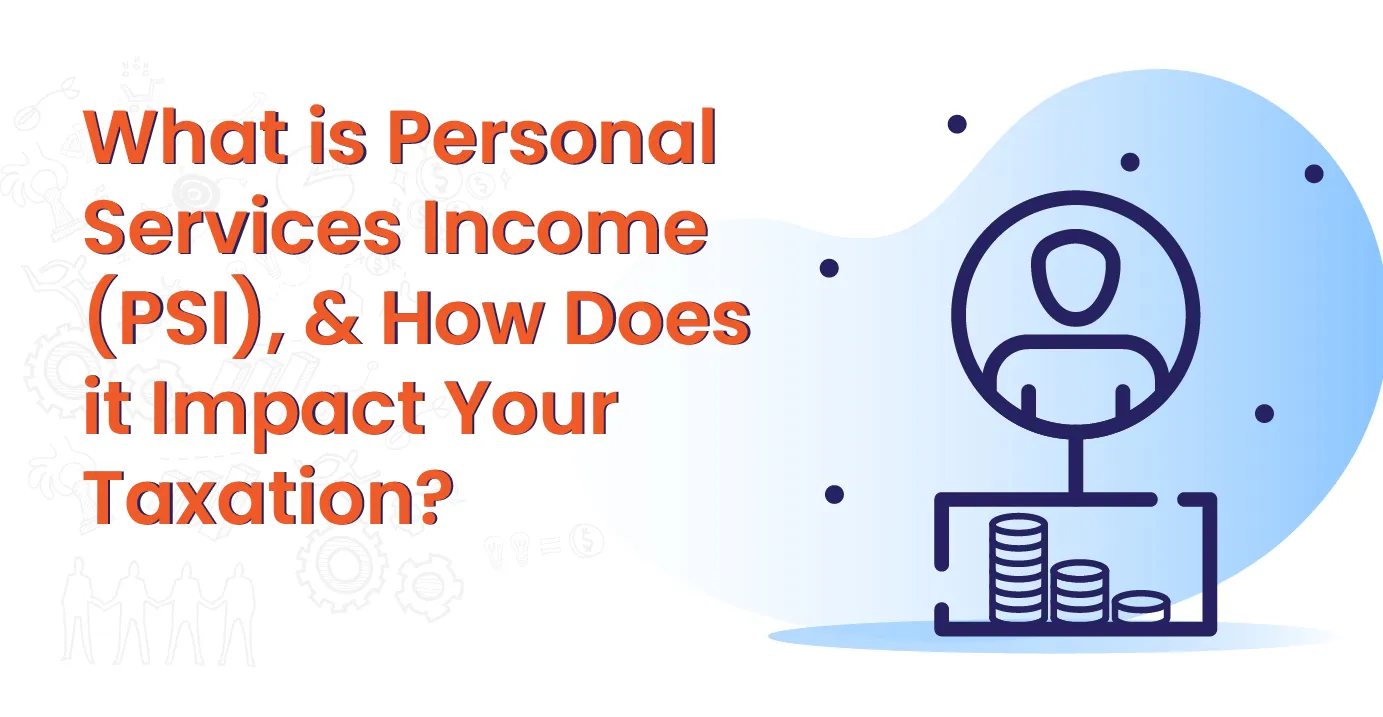
Personal Services Income (PSI) is income that you generate by offering services based on
your personal efforts. This could be anything, including the services provided by you with the
help of physical exertion, skills, or expertise. It’s important to note that Personal Services
Incomeis related to your capacity to generate income through your unique abilities.It is
codified under the Income Tax Assessment Act 1997 (ITAA 1997).
Is PSI Limited to Individuals Only?
There is a common belief that Personal Services Income applies only to freelancers or
individual contractors. But that’s not true! PSI also covers companies, partnerships, and trusts
under certain conditions. So, it doesn’t matter what your business structure is; if the income is
derived from your personal service, it will be treated as PSI under tax laws. But remember,
the PSI rules apply distinctly and depend on the structure through which the income is
earned.
The legislation clearly differentiates between PSI earned by individuals directly and income
earned by a business entity through the personal efforts of individuals within those entities.
Division 86 of the ITAA 1997 outlines the specific conditions and exclusions applicable to
entities earning PSI.
Personal Services Income rules do not apply to employees who receive standard salaries or
wages without offering personal services beyond their scope of employment. This ensures
that the PSI provisions are targeted and do not include standard employment income.
Now, let’s look at PSI’s implications on Tax Obligations.
What are the Tax Implications of PSI?
If you are engaged in some activities whose income falls under Personal Services Income, it’s
critical to understand how it impacts your tax. In such cases, PSI primarily affectstwo areas
of your tax situation:
That’s why we strongly recommend consulting a Personal Services Income tax expert in such
cases. Now, let’s understand how PSI affects key deductions.
What Key Deductions does PSI Affects?
ATO offers multiple deductions for the tax payers to reduce their tax obligation. But when it
comes to Personal Services Income, some of these deductions don’t apply. Here’s a better
understanding of the matter:
Attributed vs. Non-attributed PSI
Now, the Personal Services Income is divided into two parts: Attributed PSI and No-attributed
PSI. The distinction between attributed and non-attributed PSI is foundational in
understanding how income is taxed under PSI rules and what obligations and opportunities
arise for individuals and entities.
Attributed PSI
Attributed Personal Services Income primarily concerns individuals working in a traditional
employment setting. Here, their income directly results from their personal efforts, skills, or
expertise.
The employer withholds their taxes and reports via the Pay As You Go (PAYG) system. This
simplifies the individual’s tax reporting obligations.
The individuals receiving attributed Personal Services Income also receive a PAYG payment
summary from their employer. This summary outlines the income earned and the tax already
withheld and streamlines their tax return process.
In this structure, the arrangement is more like an employment/. So, the scope for deductions
against PSI is generally more limited.
Non-attributed PSI
Non-attributed Personal Services Income applies to sole traders and entities (such as
partnerships, companies, or trusts) that earn income through personal services.
For such individuals, the income and associated taxes are managed directly by the individual
or entity and not withheld at the source. So, this demands diligent tax planning and reporting.
The benefit here is that there may be a broader scope for claiming deductions related to the
earning of PSI. However, for that, they must meet many stringent requirements set by the PSI
rules. Moreover, the entities must accurately attribute the PSI to the individuals performing
the services. Only then is the correct reporting and taxation of income at the personal level
possible.
Eligibility for Tax Reliefs and Deductions
The Australian Tax Office (ATO) provides specific tests to determine eligibility for tax
reliefs and deductions for those earning Personal Services Income. If you can crack this test,
you can unlock significant tax advantages.
The Results Test
The Results Test
The Results Test is pivotal in determining whether an individual or entity can be exempt from
certain PSI rules, allowing for a greater range of tax deductions:
The 80% Rule
The 80% Rule (or 80/20 Rule) assesses the concentration of your income sources:
Other Assessments
Other important tests and criteria include the Unrelated Clients Test, the Employment Test,
and the Business Premises Test. Each serves to define your eligibility for PSI deductions
further:
Wrapping up
Pheww! Personal Services Income seems too complex, right? We understand that. Assessing
your PSI status, exploring tax deductions, or determining your Personal Services Income
eligibility can feel like a lot! But hey, don’t worry; we are here to help! At Nanak
Consultants, we offer a comprehensive PSI-related service to our clients. We can assist you
with meticulous tax preparation process and support you to stay compliant and optimize your
financial outcome.So do not hesitate to reach out, we will be happy to assist.
Note: PSI is a broad subject. The information mentioned here are only for a awareness of
the tax payers. Please consult professionals before taking any step
The information on this website is for general informational purposes only and should not be considered financial, taxation, or legal advice. While we strive for accuracy, Nanak Accountants does not guarantee the completeness or reliability of the content. Laws and regulations change over time, and we recommend consulting a qualified professional before making any financial or business decisions. Nanak Accountants is not liable for any loss or consequences arising from reliance on this information. For personalised advice, please contact Nanak Accountants directly.